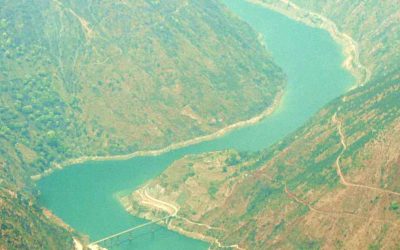The Lost Mythology of Ancient China
Reconstructing the mythology of ancient China is a painstaking task that tries to characterize some legendary figures and situations based only on the few sentences about them found in later works by philosophers and historians. The Classic of Mountains and Seas (Shanhaijing) helps to fill in some gaps, but its cryptic descriptions make it useful mainly for a small number of specialists.
A Lost Book
Much more useful is the Shiben, often translated as the Book of Origins, an ancient Chinese historical and genealogical text dating back approximately to the Warring States period (5th–3rd centuries BCE). The only problem is that the last known copy was lost during the Song dynasty, around 1,000 years ago. What would have been an irreparable loss in another culture has been partially recovered, thanks to China’s scholarly tradition. Over the past centuries, several scholars have attempted to reconstruct it based on references made in other texts that quote or cite it.
Contents of the Shiben
The Shiben is essential for understanding early Chinese history and especially how the ancient Chinese viewed their mythical and cultural origins — including royal genealogies, the beginnings of institutions, and legendary inventions. Among its main sections were the genealogies of kings and royal families, the origins of important feudal states and geographical places, and chronological lists of rulers with approximate dates or time periods.
It integrated legends and events that may have occurred in the distant past into a coherent narrative about the development of Chinese civilization. These reconstructions make the Shiben a key source for studying the historical and mythological worldview of ancient China.
Inventions from the Dawn of China
One of its most fascinating sections deals with the origins of professions, inventions, and techniques, attributing various aspects of cultural progress to their respective mythical inventors. Regardless of whether these claims hold historical accuracy, they are essential knowledge for anyone approaching Chinese culture. For example:
– Cang Jie, a minister of the Yellow Emperor, created Chinese characters by observing the tracks left by birds and animals. Legend says that when he finished, wheat rained down from the sky and spirits wept, because knowledge had entered the world — bringing both power and danger.
– Meng Tian, ignoring chronological consistency, was a general of the Qin dynasty who is credited with perfecting the Chinese brush and the use of ink made from vegetable carbon.
– Shen Nong, or the «Divine Farmer», taught humanity to cultivate grains, use plows, and identify medicinal plants. He is considered the father of agriculture and traditional Chinese medicine.
– Shaohao was the one who began domesticating animals for fieldwork and human service.
– You Chao Shi, meaning “He of the Nest”, had the idea of building elevated houses to protect people from wild animals and natural elements — a crucial step toward a sedentary lifestyle.
– Leizu, wife of the Yellow Emperor, is credited with discovering sericulture after observing silkworms making cocoons on mulberry leaves.
– Fu Xi, among other inventions, is attributed with creating fishing nets and the system of trigrams that later evolved into the I Ching (Yijing).
– Ling Lun, a musician of the Yellow Emperor, is said to have created the first Chinese musical scales based on bird songs.
– Gao Yao, a justice minister under Emperors Yao and Shun, laid the foundations of Chinese penal law and used a mythical unicorn (xiezhi) to detect lies and resolve disputes.
– Xi Zhong is credited with inventing wheeled carts — a major improvement in land transportation.
About me: I have spent 30 years in China, much of the time traveling and studying this country’s culture. My most popular research focuses on Chinese characters (Chinese Characters: An Easy Learning Method Based on Their Etymology and Evolution), Matriarchy in China (there is a book with this title), and minority cultures (The Naxi of Southwest China). In my travels, I have specialized in Yunnan, Tibet, the Silk Road, and other lesser-known places. Feel free to write to me if you’re planning a trip to China. The agency I collaborate with offers excellent service at an unbeatable price. You’ll find my email below.
Last posts
Basic Geography of China
Basic Geography of China The People's Republic of China, with an area of more than 9,600,000 km2 is the third largest country on our planet, after Russia and Canada. The name China derives from the name given to it by its neighbors, because the Chinese call their own...
The religions of China
The religions of China Every people has the religion they inherit from their ancestors. This widely spread aphorism is truer in China than in other countries. Scholars say that the primitive religion of the Chinese, as of the peoples who lived near them, was the cult...
Notes on the Chinese theater
Notes on the Chinese theater The Chinese were extremely fond of theatrical performances. According to their traditions these originated in the time of Emperor Ming Huang of the Tang dynasty, later revered as the patron saint of actors, without whose help it is...
Taoist ceremony of repaying the debt
Taoist ceremony of repaying the debt Last week (on the 17th day of the fourth lunar month, 2018) took place at Zhenqing Temple (真庆观), the largest Taoist temple in Kunming and the best-preserved so far, the ceremony called "Repaying the Debt of Life". That ceremony is...
Classics of Filial Piety
Classics of Filial Piety Since the establishment of a Confucian society in the Han dynasty, some two thousand years ago, filial piety could be considered the central pillar around which Chinese society has been built. The behavior of each person towards his father...
Teahouse: A Drama by Lao She
In Brief: One of the best contemporary plays compels multiple reflections on hope and power, and perhaps that universal dream of living in a just society. A drama that unfolds in a limited space spanning half a century of Chinese history. In the three acts in which it...










